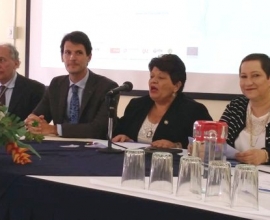Inter-agency meeting with EUROsociAL in Costa Rica: results review and perspectives
The fourth of the seven meetings planned to analyse the results achieved with the contributions of the EUROsociAL Programme and outline orientations for the next phase was held in Costa Rica
On the 31st, the Costa Rican institutions the programme has supported over these years, and other institutional stakeholders, participated in the Review and perspectives of the EUROsociAL Programme in Costa Rica meeting organised by the Delegation of the European Union and the Commission European Programme for social cohesion in Latin America.
The meeting was opened by Costa Rica's Minister of Planning, Olga Martha Sánchez Oviedo, and the European Union Ambassador to the country, Pelayo Castro Zuzuarregui. The Minister also presented, in an inaugural conference, the progress and challenges of the 2015–2018 National Development Plan (available here for consultation), the lodestar for the new phase of the programme.
The purpose of the meeting was, on one hand, to analyse the results achieved, strong points, and critical points in the implementation of EUROsociAL II, and, on the other, to get a glimpse of the main methodological and agenda orientations for the programme's next five-year phase.
Main conclusions on the results achieved and EUROsociAL's cooperation method
- All the institutions highlighted the effectiveness of the EUROsociAL Programme's cooperation, which has contributed substantially to the achievement of very concrete and necessary results in different public policy areas.
- The programme's working methodology (demand-driven, results-orientation, peer-to-peer cooperation, national and regional dimension) was also highlighted, with special appreciation for programme's respectful approach to government priorities, as well as its flexibility in adapting to the country's pace and processes.
- There are some improvements that it would be useful to introduce: greater communication between the institutions supported by the programme (some actions could be highly synergistic); greater consideration of possible contributions by private experts-consultants (although with experience in public management); joint review between the programme and the national institution of the terms of reference for the international experts; among others.
Main conclusions regarding the country agenda and the mission of the next phase of EUROsociAL
- As was done in relation to the methodological aspects and also with respect to the work plan for the next phase of the programme, special emphasis was placed on the need to provide continuity to the support actions already undertaken with EUROsociAL II.
- It was, however, recognised that there is a need to align with the country agenda. Placing special value on the inputs the Minister of Planning offered in this regard in her conference, one possible strategy for defining EUROsociAL's future framework might be a national inter-agency meeting on the country agenda based on the National Development Plan for the purpose of establishing priorities. In this same context of proposals, some participants suggested that the roadmap of reforms for joining the OECD, as well as the 2030 Sustainable Development Agenda, would be a good reference platform for channelling the support of EUROsociAL.
The institutions participating in the meeting were the following: Ministry of Foreign Relations (International Cooperation Directorate), Ministry of Finance, Ministry of Planning, Ministry of Justice and Peace, Ministry of Human Development and Social Inclusions, Ministry of Labour, Public Prosecutor's Office - Judiciary, Presidential Social Council, Joint Institute on Social Aid (IMAS), Costa Rican Public Defender's Office, United Nations Latin American Institute for the Prevention of Crime and the Treatment of Offenders (ILANUD), Supreme Court of Justice, Central American Institute of Public Administration (ICAP), Inter-American Centre for Tax Administrations (CIAT). The EUROsociAL external evaluation team also attended the meeting. The EUROsociAL Programme was represented by the three coordinating institutions of the different thematic lines, the International and Ibero-American Foundation for Administration and Public Policies (FIIAPP), the Instituto Italo Latinoamericano (IILA) and Expertise France, respectively.
IILA

